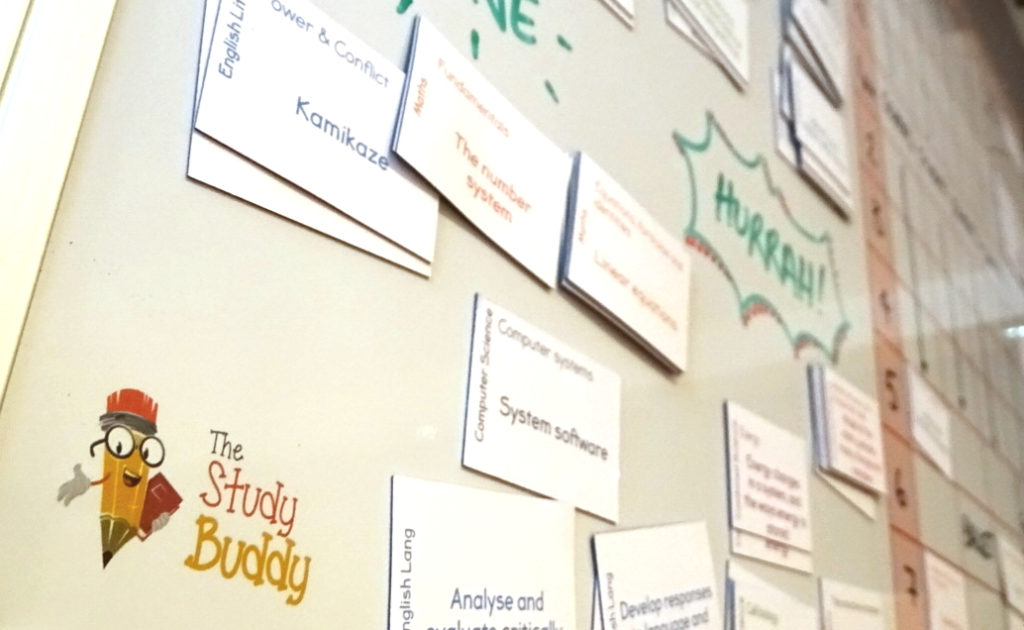How Can Parents Help Children Revise?
By
6 years ago

Homework is one thing, revision is something else entirely…
Parents trying to encourage their child to revise or monitor how they are progressing through subject material, may be frustrated with juggling multiple subjects with complex syllabuses and exam structures. Nathan McGurl, founder and inventor of Study Buddy, a new revision time management tool, found himself in the same position when his own children were studying for their GCSEs.

Study Buddy allows parents to have a visual overview of their child’s revision programme according to 250 different GSCE syllabuses on the national curriculum. It also ensures that children can plan their time more effectively, so that an agreeable work/play balance can be maintained throughout the period. This even irons out any potential issues your child may have with procrastination, subject avoidance or even simply forgetting certain topics by accident – finding this out at the last minute causes lots of unwanted yet easily avoided stress.
Iain Kilpatrick, Headmaster at Sidcot School, an independent school in Somerset that was the first to pilot the tool, explains ‘This approach gives students clear, achievable objectives, safe in the knowledge that they are working towards clearly defined goals. This helps to build their confidence which is key to unlocking their potential.’
We spoke to Nathan to get his top tips on how you can help you child revise at home. Here are his eight top tips.
1 Agree the rules
Ground rules are important. They are also easier to agree before they are needed. Popular ones include putting the phone in a cupboard, making sure that students get a good night’s sleep, and not sleeping past 11am. But rules work both ways, keeping a supply of sugary snacks (or organic carrot sticks if you prefer) in the house, or promising not to nag about progress are great ways of showing that everyone is pulling together.
2 Remove the distractions
When faced with a chore we’d rather not do, it doesn’t take a lot to veer off task. For many students, studying is such a chore. Make sure that the little obstacles don’t become huge road blocks by removing them. So, sharpen all the pencils, organise folders and buy the required variety of coloured highlighters. Get everything ready so that the options for procrastination are limited.
3 Create the backlog
Knowing exactlywhat you have to do is essential to working systematically. It is the cornerstone of The Study Buddy approach. Using text books, exam specifications or even school notes, you can create a comprehensive list of the topics and sub topics. Write these down, preferably on their own cards, or tick lists also work. Think about sub topics as being the level above the detail. For example History > The Norman Conquest > The Battle of Hastings. This way you can target getting a unit done in one revision session.

4 Work out the free time
A balance of study and social life is crucial, not just for personal growth but also for a healthy mental wellbeing. Before structuring the revision, sort out when you can’t do it. Block out time for commitments such as school and extracurricular activities. Then build in time for having a life: parties and the all-important lie-ins. Now, the blank time is fair game.
5 Allocate work sensibly
It is ultimately counter-productive to spend all your free time studying. How much study a student can do will vary wildly from one to another. Be realistic. A plan should be geared to success, because if you consistently fail then motivation will bottom out. Build in regular breaks and encourage exercise – even if that is simply taking a walk to the cupboard to retrieve the phone between sessions!
6 Review and monitor regularly
Key to the process is to uncover what is working well and what needs to be adapted. A regular, scheduled session prevents the feeling that this is an intervention. Because they shouldn’t be. During the reviews you should think of yourself as a coach, rather than a parent. For the next 20 minutes your function is to guide and support – not exert control or dictate actions.
Start by looking back at the week. With our approach and physical units, there is a lot of satisfaction derived from moving a card from ‘to do’ to a ‘done’ pile. This process feels good because the ‘to do’ pile is getting smaller, and it helps because it brings the focus to near term goals. Getting to the end of the week is so much more in our grasp. Now weekly progress feels like winning. And that feeling is highly motivating.
This is no time to be judgemental if things haven’t happened exactly as they should have. Anything that wasn’t done simply returns to the ‘to do’ list. It’s important to look for roots causes. Is there something that should be changed for next week? Perhaps energy is low on Wednesdays, in which case don’t schedule revision for then. It won’t always be necessary to adapt the plan, sometimes we just have a bad day!
7 Repeat
Buoyed by the success of the process, keep it going. Those topics aren’t going to revise themselves! As your continue, the amount of control that the student feels has a direct bearing on the desire to continue. Over time, they will open up about their challenges. You should encourage this. Being judgement-free is the trigger. If your child worries what you will say or think, then they are more likely to hide what is really happening, and that doesn’t help anybody.
8 Celebrate success
There is no evidence that outlandish rewards for grades has any effect on effort or attainment. However a spontaneous ‘pat on the back’ for trying hard or simply ‘sticking to it’ can positively reinforce self-belief. This is turn drives confidence and a desire to follow the process.
The Study Buddy’s new revision techniques start from £5.49 per subject and are available from www.thestudybuddy.com.
READ MORE: The Bonus Benefits of Yoga for Youngsters



